Challenges and Solutions for Spiritual Care in Nursing: A Review
VerifiedAdded on 2022/11/19
|9
|2484
|102
Essay
AI Summary
This essay addresses the critical issue of the lack of spiritual care in nursing, highlighting its importance in improving patient well-being and recovery. It examines the challenges nurses face, including lack of training, understanding of their role, and recognition of the common good in healthcare. The essay emphasizes that spiritual care is integral to holistic patient care and discusses practical solutions such as integrating spiritual care education into nursing curricula, applying Parse’s Theory of Human Becoming, utilizing dignity therapy, promoting patient advocacy, and engaging the community. By implementing these strategies, nurses can overcome barriers, enhance their ability to provide comprehensive care, and improve patient outcomes. The essay references multiple studies to support its claims, and emphasizes the importance of spiritual care in addressing the patient's needs.
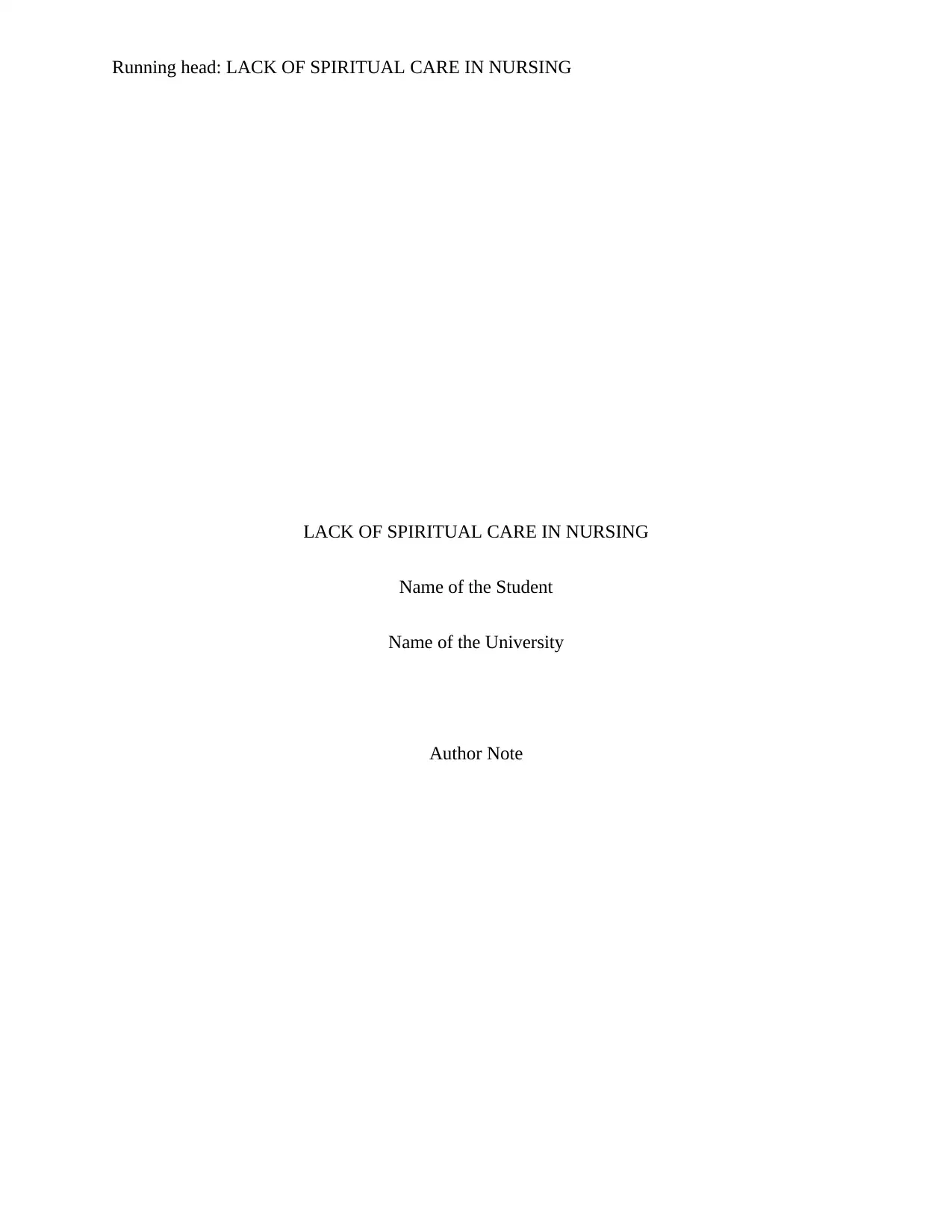
Running head: LACK OF SPIRITUAL CARE IN NURSING
LACK OF SPIRITUAL CARE IN NURSING
Name of the Student
Name of the University
Author Note
LACK OF SPIRITUAL CARE IN NURSING
Name of the Student
Name of the University
Author Note
Paraphrase This Document
Need a fresh take? Get an instant paraphrase of this document with our AI Paraphraser
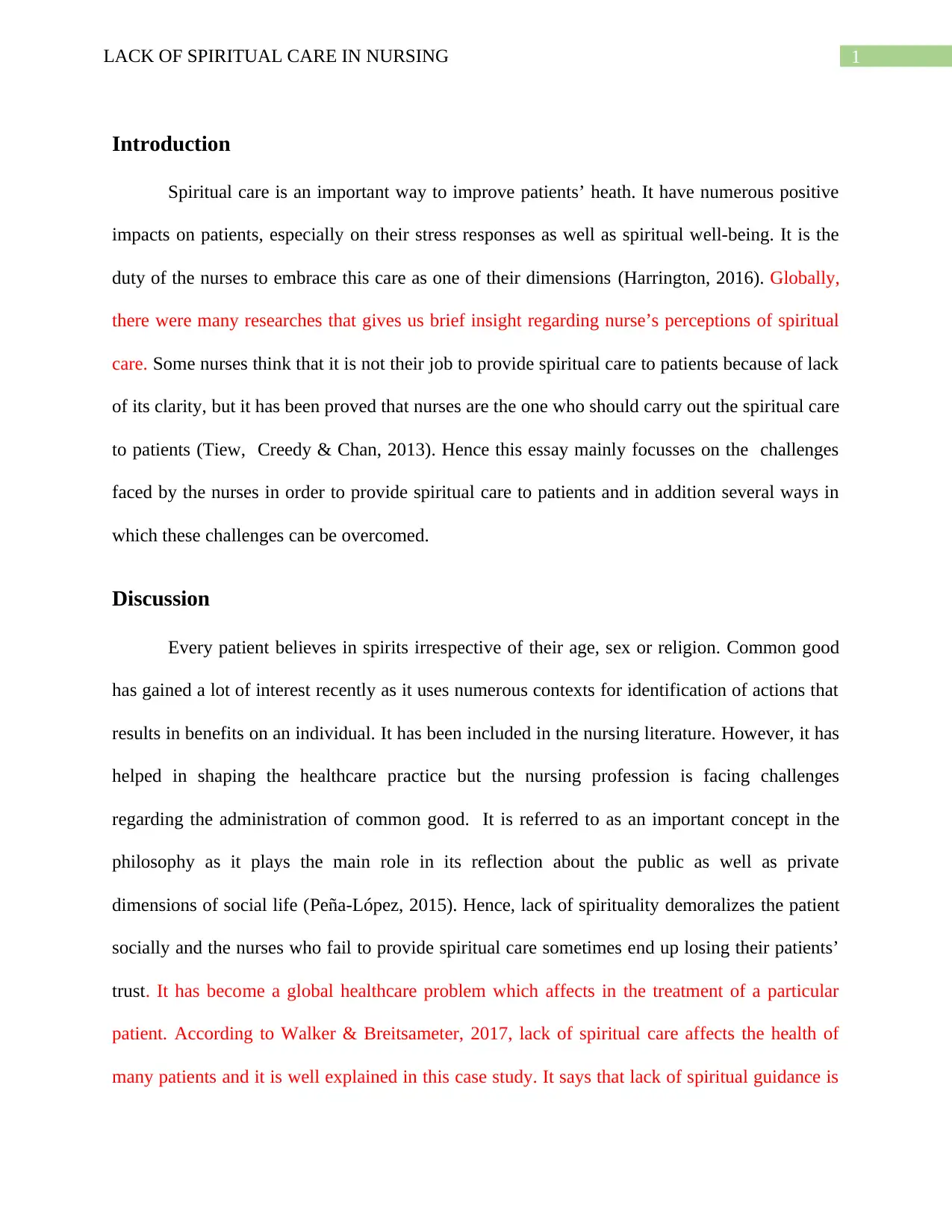
1LACK OF SPIRITUAL CARE IN NURSING
Introduction
Spiritual care is an important way to improve patients’ heath. It have numerous positive
impacts on patients, especially on their stress responses as well as spiritual well-being. It is the
duty of the nurses to embrace this care as one of their dimensions (Harrington, 2016). Globally,
there were many researches that gives us brief insight regarding nurse’s perceptions of spiritual
care. Some nurses think that it is not their job to provide spiritual care to patients because of lack
of its clarity, but it has been proved that nurses are the one who should carry out the spiritual care
to patients (Tiew, Creedy & Chan, 2013). Hence this essay mainly focusses on the challenges
faced by the nurses in order to provide spiritual care to patients and in addition several ways in
which these challenges can be overcomed.
Discussion
Every patient believes in spirits irrespective of their age, sex or religion. Common good
has gained a lot of interest recently as it uses numerous contexts for identification of actions that
results in benefits on an individual. It has been included in the nursing literature. However, it has
helped in shaping the healthcare practice but the nursing profession is facing challenges
regarding the administration of common good. It is referred to as an important concept in the
philosophy as it plays the main role in its reflection about the public as well as private
dimensions of social life (Peña-López, 2015). Hence, lack of spirituality demoralizes the patient
socially and the nurses who fail to provide spiritual care sometimes end up losing their patients’
trust. It has become a global healthcare problem which affects in the treatment of a particular
patient. According to Walker & Breitsameter, 2017, lack of spiritual care affects the health of
many patients and it is well explained in this case study. It says that lack of spiritual guidance is
Introduction
Spiritual care is an important way to improve patients’ heath. It have numerous positive
impacts on patients, especially on their stress responses as well as spiritual well-being. It is the
duty of the nurses to embrace this care as one of their dimensions (Harrington, 2016). Globally,
there were many researches that gives us brief insight regarding nurse’s perceptions of spiritual
care. Some nurses think that it is not their job to provide spiritual care to patients because of lack
of its clarity, but it has been proved that nurses are the one who should carry out the spiritual care
to patients (Tiew, Creedy & Chan, 2013). Hence this essay mainly focusses on the challenges
faced by the nurses in order to provide spiritual care to patients and in addition several ways in
which these challenges can be overcomed.
Discussion
Every patient believes in spirits irrespective of their age, sex or religion. Common good
has gained a lot of interest recently as it uses numerous contexts for identification of actions that
results in benefits on an individual. It has been included in the nursing literature. However, it has
helped in shaping the healthcare practice but the nursing profession is facing challenges
regarding the administration of common good. It is referred to as an important concept in the
philosophy as it plays the main role in its reflection about the public as well as private
dimensions of social life (Peña-López, 2015). Hence, lack of spirituality demoralizes the patient
socially and the nurses who fail to provide spiritual care sometimes end up losing their patients’
trust. It has become a global healthcare problem which affects in the treatment of a particular
patient. According to Walker & Breitsameter, 2017, lack of spiritual care affects the health of
many patients and it is well explained in this case study. It says that lack of spiritual guidance is
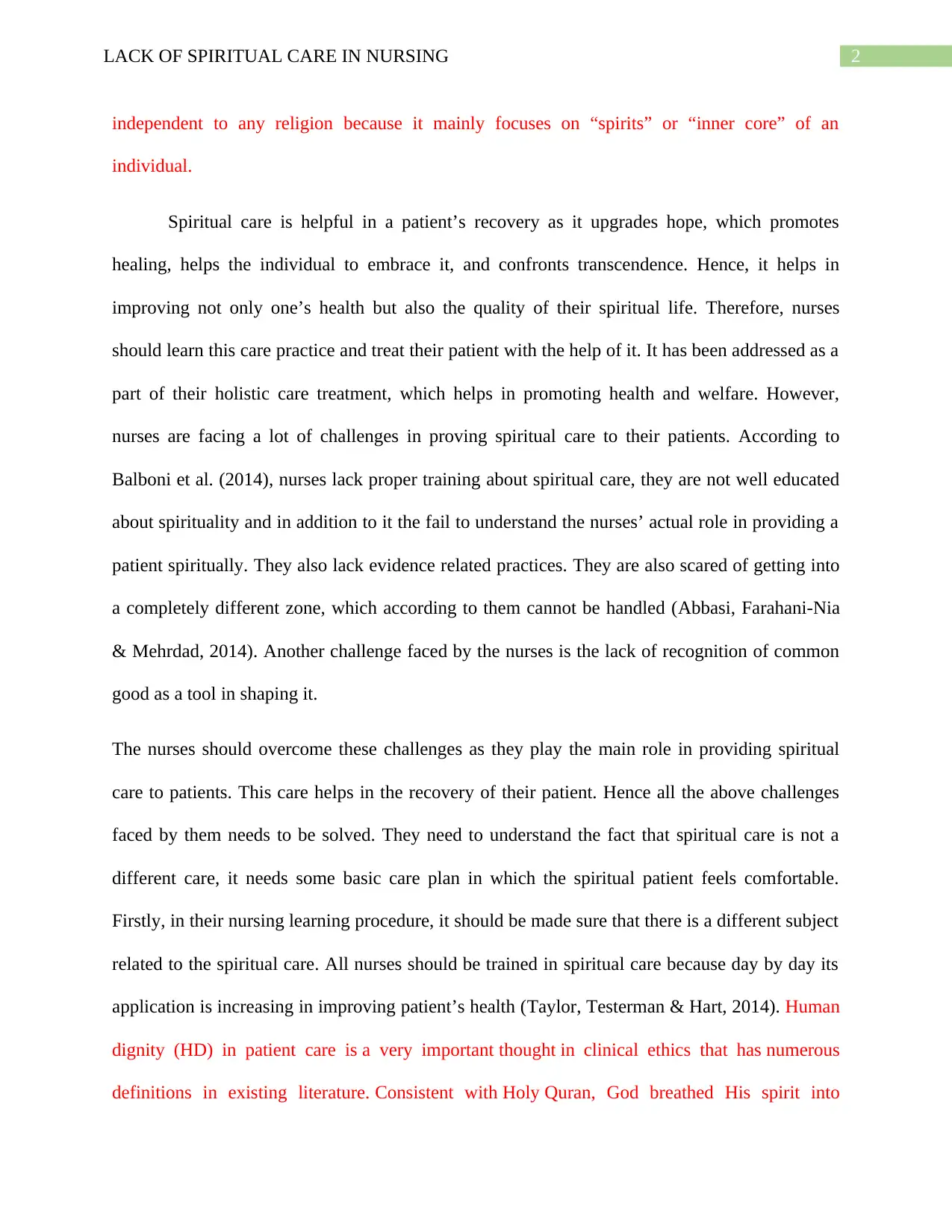
2LACK OF SPIRITUAL CARE IN NURSING
independent to any religion because it mainly focuses on “spirits” or “inner core” of an
individual.
Spiritual care is helpful in a patient’s recovery as it upgrades hope, which promotes
healing, helps the individual to embrace it, and confronts transcendence. Hence, it helps in
improving not only one’s health but also the quality of their spiritual life. Therefore, nurses
should learn this care practice and treat their patient with the help of it. It has been addressed as a
part of their holistic care treatment, which helps in promoting health and welfare. However,
nurses are facing a lot of challenges in proving spiritual care to their patients. According to
Balboni et al. (2014), nurses lack proper training about spiritual care, they are not well educated
about spirituality and in addition to it the fail to understand the nurses’ actual role in providing a
patient spiritually. They also lack evidence related practices. They are also scared of getting into
a completely different zone, which according to them cannot be handled (Abbasi, Farahani-Nia
& Mehrdad, 2014). Another challenge faced by the nurses is the lack of recognition of common
good as a tool in shaping it.
The nurses should overcome these challenges as they play the main role in providing spiritual
care to patients. This care helps in the recovery of their patient. Hence all the above challenges
faced by them needs to be solved. They need to understand the fact that spiritual care is not a
different care, it needs some basic care plan in which the spiritual patient feels comfortable.
Firstly, in their nursing learning procedure, it should be made sure that there is a different subject
related to the spiritual care. All nurses should be trained in spiritual care because day by day its
application is increasing in improving patient’s health (Taylor, Testerman & Hart, 2014). Human
dignity (HD) in patient care is a very important thought in clinical ethics that has numerous
definitions in existing literature. Consistent with Holy Quran, God breathed His spirit into
independent to any religion because it mainly focuses on “spirits” or “inner core” of an
individual.
Spiritual care is helpful in a patient’s recovery as it upgrades hope, which promotes
healing, helps the individual to embrace it, and confronts transcendence. Hence, it helps in
improving not only one’s health but also the quality of their spiritual life. Therefore, nurses
should learn this care practice and treat their patient with the help of it. It has been addressed as a
part of their holistic care treatment, which helps in promoting health and welfare. However,
nurses are facing a lot of challenges in proving spiritual care to their patients. According to
Balboni et al. (2014), nurses lack proper training about spiritual care, they are not well educated
about spirituality and in addition to it the fail to understand the nurses’ actual role in providing a
patient spiritually. They also lack evidence related practices. They are also scared of getting into
a completely different zone, which according to them cannot be handled (Abbasi, Farahani-Nia
& Mehrdad, 2014). Another challenge faced by the nurses is the lack of recognition of common
good as a tool in shaping it.
The nurses should overcome these challenges as they play the main role in providing spiritual
care to patients. This care helps in the recovery of their patient. Hence all the above challenges
faced by them needs to be solved. They need to understand the fact that spiritual care is not a
different care, it needs some basic care plan in which the spiritual patient feels comfortable.
Firstly, in their nursing learning procedure, it should be made sure that there is a different subject
related to the spiritual care. All nurses should be trained in spiritual care because day by day its
application is increasing in improving patient’s health (Taylor, Testerman & Hart, 2014). Human
dignity (HD) in patient care is a very important thought in clinical ethics that has numerous
definitions in existing literature. Consistent with Holy Quran, God breathed His spirit into
⊘ This is a preview!⊘
Do you want full access?
Subscribe today to unlock all pages.

Trusted by 1+ million students worldwide
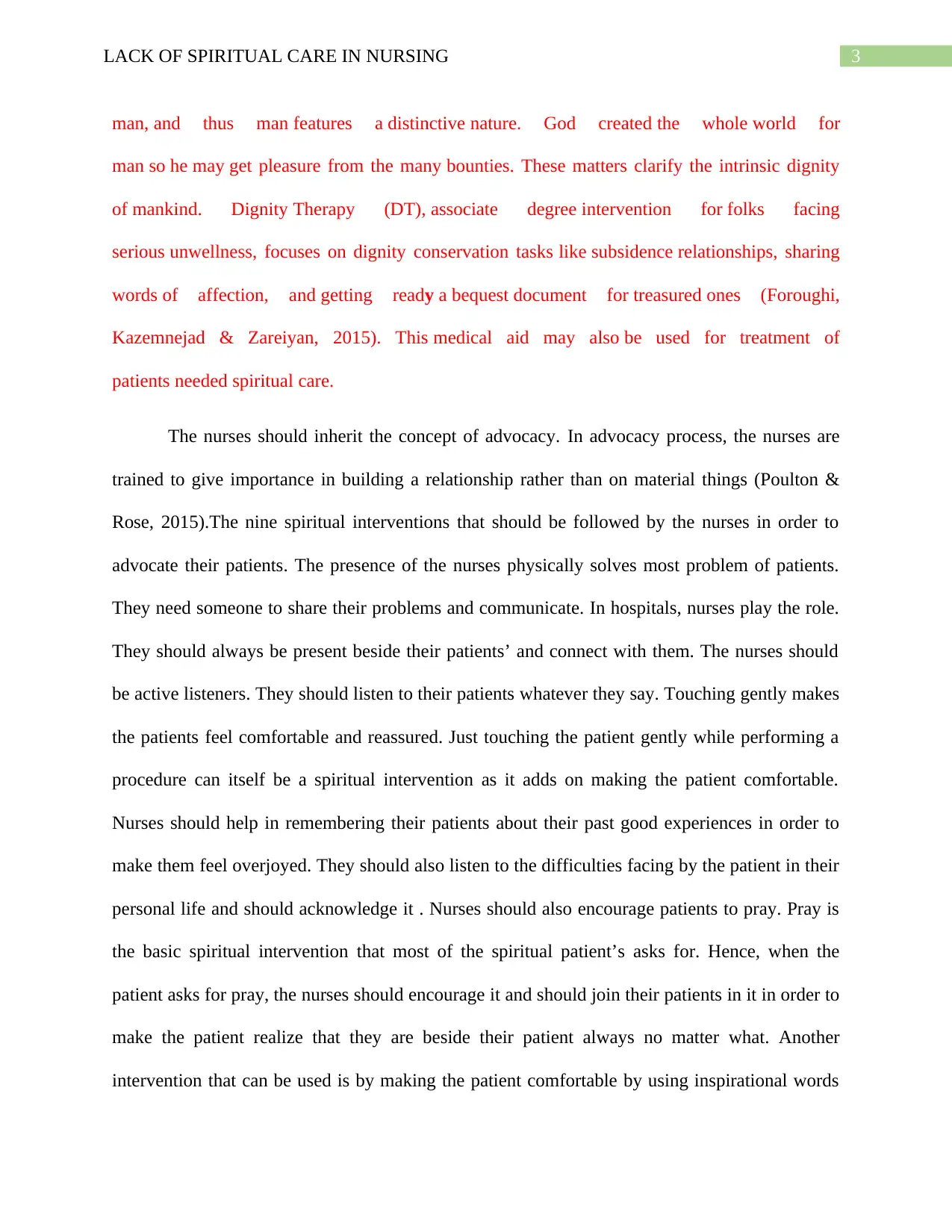
3LACK OF SPIRITUAL CARE IN NURSING
man, and thus man features a distinctive nature. God created the whole world for
man so he may get pleasure from the many bounties. These matters clarify the intrinsic dignity
of mankind. Dignity Therapy (DT), associate degree intervention for folks facing
serious unwellness, focuses on dignity conservation tasks like subsidence relationships, sharing
words of affection, and getting ready a bequest document for treasured ones (Foroughi,
Kazemnejad & Zareiyan, 2015). This medical aid may also be used for treatment of
patients needed spiritual care.
The nurses should inherit the concept of advocacy. In advocacy process, the nurses are
trained to give importance in building a relationship rather than on material things (Poulton &
Rose, 2015).The nine spiritual interventions that should be followed by the nurses in order to
advocate their patients. The presence of the nurses physically solves most problem of patients.
They need someone to share their problems and communicate. In hospitals, nurses play the role.
They should always be present beside their patients’ and connect with them. The nurses should
be active listeners. They should listen to their patients whatever they say. Touching gently makes
the patients feel comfortable and reassured. Just touching the patient gently while performing a
procedure can itself be a spiritual intervention as it adds on making the patient comfortable.
Nurses should help in remembering their patients about their past good experiences in order to
make them feel overjoyed. They should also listen to the difficulties facing by the patient in their
personal life and should acknowledge it . Nurses should also encourage patients to pray. Pray is
the basic spiritual intervention that most of the spiritual patient’s asks for. Hence, when the
patient asks for pray, the nurses should encourage it and should join their patients in it in order to
make the patient realize that they are beside their patient always no matter what. Another
intervention that can be used is by making the patient comfortable by using inspirational words
man, and thus man features a distinctive nature. God created the whole world for
man so he may get pleasure from the many bounties. These matters clarify the intrinsic dignity
of mankind. Dignity Therapy (DT), associate degree intervention for folks facing
serious unwellness, focuses on dignity conservation tasks like subsidence relationships, sharing
words of affection, and getting ready a bequest document for treasured ones (Foroughi,
Kazemnejad & Zareiyan, 2015). This medical aid may also be used for treatment of
patients needed spiritual care.
The nurses should inherit the concept of advocacy. In advocacy process, the nurses are
trained to give importance in building a relationship rather than on material things (Poulton &
Rose, 2015).The nine spiritual interventions that should be followed by the nurses in order to
advocate their patients. The presence of the nurses physically solves most problem of patients.
They need someone to share their problems and communicate. In hospitals, nurses play the role.
They should always be present beside their patients’ and connect with them. The nurses should
be active listeners. They should listen to their patients whatever they say. Touching gently makes
the patients feel comfortable and reassured. Just touching the patient gently while performing a
procedure can itself be a spiritual intervention as it adds on making the patient comfortable.
Nurses should help in remembering their patients about their past good experiences in order to
make them feel overjoyed. They should also listen to the difficulties facing by the patient in their
personal life and should acknowledge it . Nurses should also encourage patients to pray. Pray is
the basic spiritual intervention that most of the spiritual patient’s asks for. Hence, when the
patient asks for pray, the nurses should encourage it and should join their patients in it in order to
make the patient realize that they are beside their patient always no matter what. Another
intervention that can be used is by making the patient comfortable by using inspirational words
Paraphrase This Document
Need a fresh take? Get an instant paraphrase of this document with our AI Paraphraser
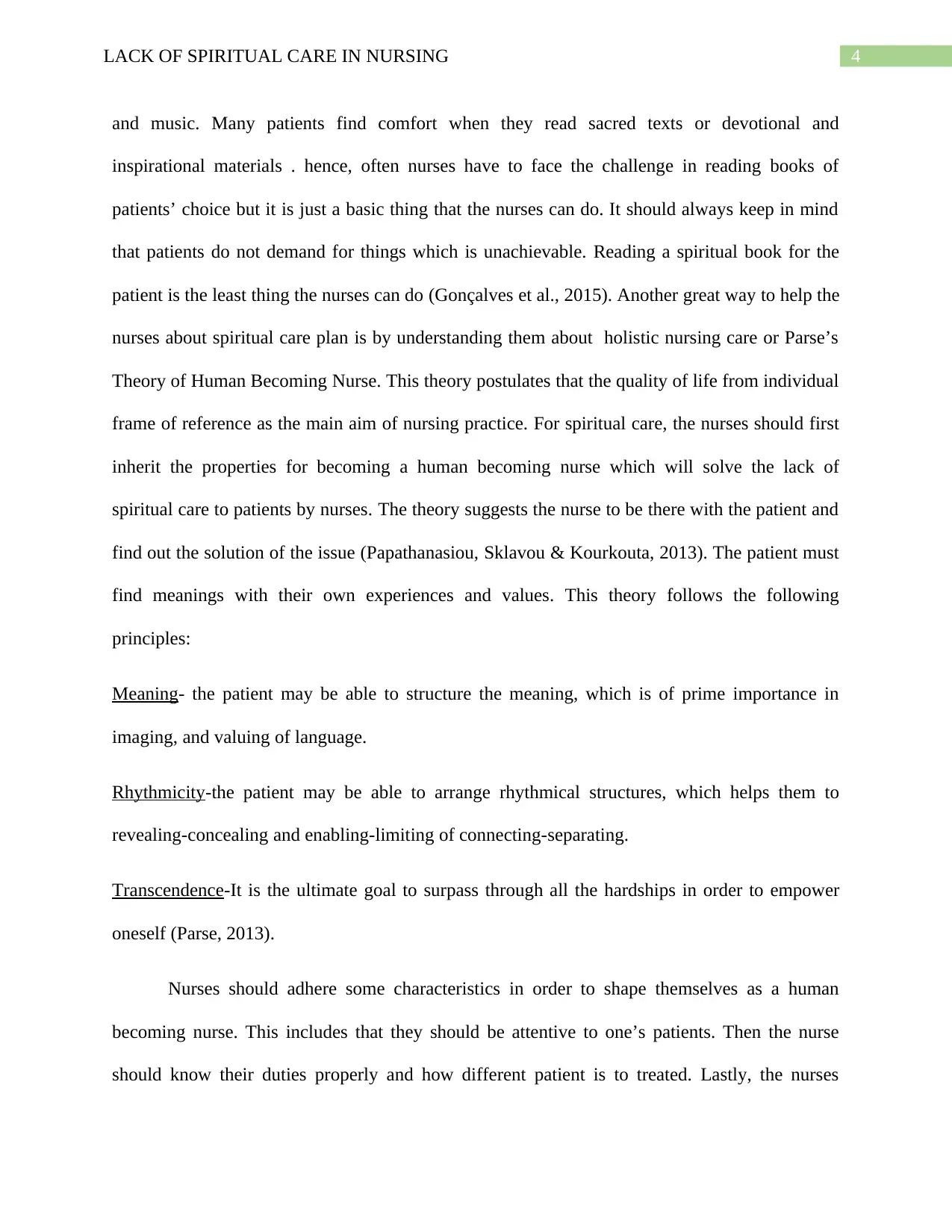
4LACK OF SPIRITUAL CARE IN NURSING
and music. Many patients find comfort when they read sacred texts or devotional and
inspirational materials . hence, often nurses have to face the challenge in reading books of
patients’ choice but it is just a basic thing that the nurses can do. It should always keep in mind
that patients do not demand for things which is unachievable. Reading a spiritual book for the
patient is the least thing the nurses can do (Gonçalves et al., 2015). Another great way to help the
nurses about spiritual care plan is by understanding them about holistic nursing care or Parse’s
Theory of Human Becoming Nurse. This theory postulates that the quality of life from individual
frame of reference as the main aim of nursing practice. For spiritual care, the nurses should first
inherit the properties for becoming a human becoming nurse which will solve the lack of
spiritual care to patients by nurses. The theory suggests the nurse to be there with the patient and
find out the solution of the issue (Papathanasiou, Sklavou & Kourkouta, 2013). The patient must
find meanings with their own experiences and values. This theory follows the following
principles:
Meaning- the patient may be able to structure the meaning, which is of prime importance in
imaging, and valuing of language.
Rhythmicity-the patient may be able to arrange rhythmical structures, which helps them to
revealing-concealing and enabling-limiting of connecting-separating.
Transcendence-It is the ultimate goal to surpass through all the hardships in order to empower
oneself (Parse, 2013).
Nurses should adhere some characteristics in order to shape themselves as a human
becoming nurse. This includes that they should be attentive to one’s patients. Then the nurse
should know their duties properly and how different patient is to treated. Lastly, the nurses
and music. Many patients find comfort when they read sacred texts or devotional and
inspirational materials . hence, often nurses have to face the challenge in reading books of
patients’ choice but it is just a basic thing that the nurses can do. It should always keep in mind
that patients do not demand for things which is unachievable. Reading a spiritual book for the
patient is the least thing the nurses can do (Gonçalves et al., 2015). Another great way to help the
nurses about spiritual care plan is by understanding them about holistic nursing care or Parse’s
Theory of Human Becoming Nurse. This theory postulates that the quality of life from individual
frame of reference as the main aim of nursing practice. For spiritual care, the nurses should first
inherit the properties for becoming a human becoming nurse which will solve the lack of
spiritual care to patients by nurses. The theory suggests the nurse to be there with the patient and
find out the solution of the issue (Papathanasiou, Sklavou & Kourkouta, 2013). The patient must
find meanings with their own experiences and values. This theory follows the following
principles:
Meaning- the patient may be able to structure the meaning, which is of prime importance in
imaging, and valuing of language.
Rhythmicity-the patient may be able to arrange rhythmical structures, which helps them to
revealing-concealing and enabling-limiting of connecting-separating.
Transcendence-It is the ultimate goal to surpass through all the hardships in order to empower
oneself (Parse, 2013).
Nurses should adhere some characteristics in order to shape themselves as a human
becoming nurse. This includes that they should be attentive to one’s patients. Then the nurse
should know their duties properly and how different patient is to treated. Lastly, the nurses
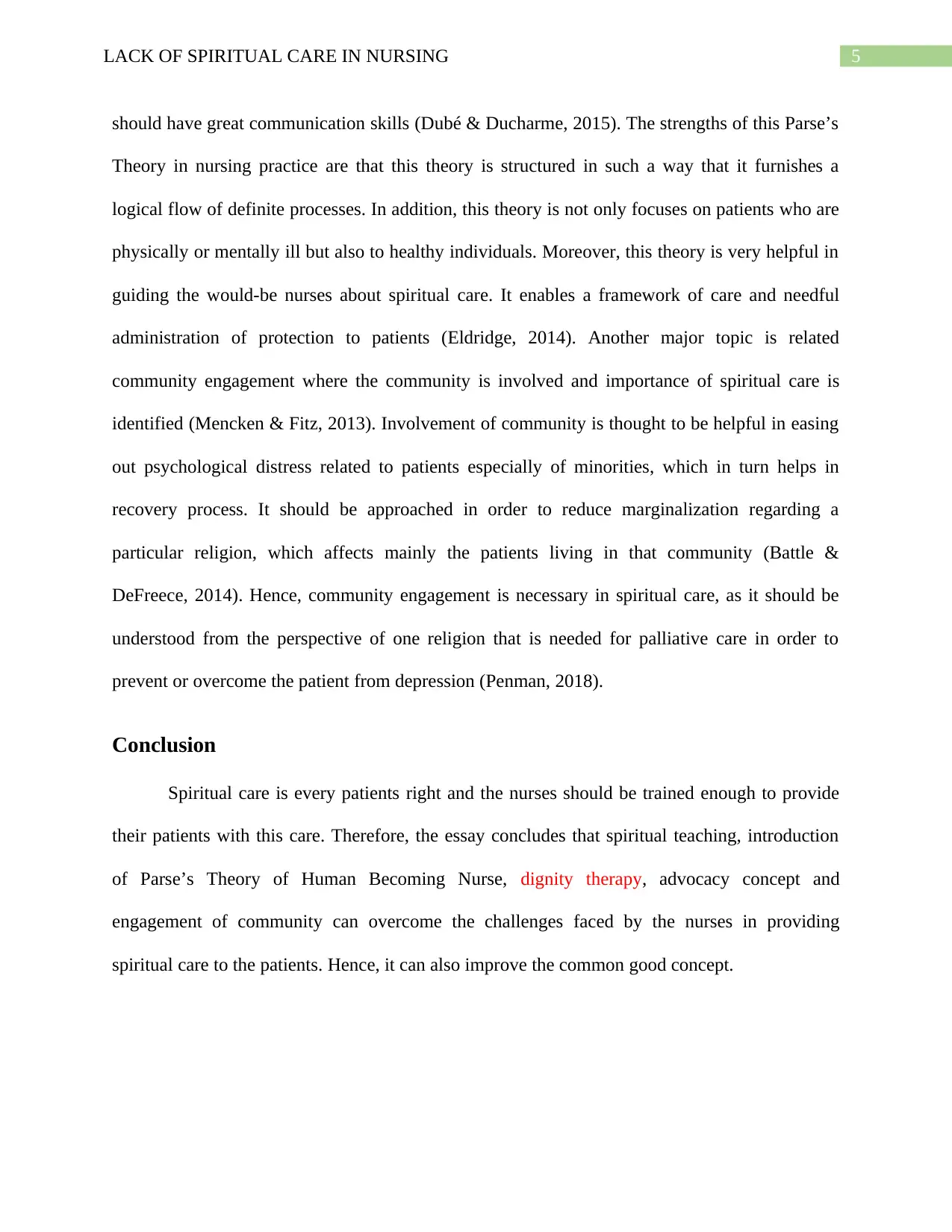
5LACK OF SPIRITUAL CARE IN NURSING
should have great communication skills (Dubé & Ducharme, 2015). The strengths of this Parse’s
Theory in nursing practice are that this theory is structured in such a way that it furnishes a
logical flow of definite processes. In addition, this theory is not only focuses on patients who are
physically or mentally ill but also to healthy individuals. Moreover, this theory is very helpful in
guiding the would-be nurses about spiritual care. It enables a framework of care and needful
administration of protection to patients (Eldridge, 2014). Another major topic is related
community engagement where the community is involved and importance of spiritual care is
identified (Mencken & Fitz, 2013). Involvement of community is thought to be helpful in easing
out psychological distress related to patients especially of minorities, which in turn helps in
recovery process. It should be approached in order to reduce marginalization regarding a
particular religion, which affects mainly the patients living in that community (Battle &
DeFreece, 2014). Hence, community engagement is necessary in spiritual care, as it should be
understood from the perspective of one religion that is needed for palliative care in order to
prevent or overcome the patient from depression (Penman, 2018).
Conclusion
Spiritual care is every patients right and the nurses should be trained enough to provide
their patients with this care. Therefore, the essay concludes that spiritual teaching, introduction
of Parse’s Theory of Human Becoming Nurse, dignity therapy, advocacy concept and
engagement of community can overcome the challenges faced by the nurses in providing
spiritual care to the patients. Hence, it can also improve the common good concept.
should have great communication skills (Dubé & Ducharme, 2015). The strengths of this Parse’s
Theory in nursing practice are that this theory is structured in such a way that it furnishes a
logical flow of definite processes. In addition, this theory is not only focuses on patients who are
physically or mentally ill but also to healthy individuals. Moreover, this theory is very helpful in
guiding the would-be nurses about spiritual care. It enables a framework of care and needful
administration of protection to patients (Eldridge, 2014). Another major topic is related
community engagement where the community is involved and importance of spiritual care is
identified (Mencken & Fitz, 2013). Involvement of community is thought to be helpful in easing
out psychological distress related to patients especially of minorities, which in turn helps in
recovery process. It should be approached in order to reduce marginalization regarding a
particular religion, which affects mainly the patients living in that community (Battle &
DeFreece, 2014). Hence, community engagement is necessary in spiritual care, as it should be
understood from the perspective of one religion that is needed for palliative care in order to
prevent or overcome the patient from depression (Penman, 2018).
Conclusion
Spiritual care is every patients right and the nurses should be trained enough to provide
their patients with this care. Therefore, the essay concludes that spiritual teaching, introduction
of Parse’s Theory of Human Becoming Nurse, dignity therapy, advocacy concept and
engagement of community can overcome the challenges faced by the nurses in providing
spiritual care to the patients. Hence, it can also improve the common good concept.
⊘ This is a preview!⊘
Do you want full access?
Subscribe today to unlock all pages.

Trusted by 1+ million students worldwide
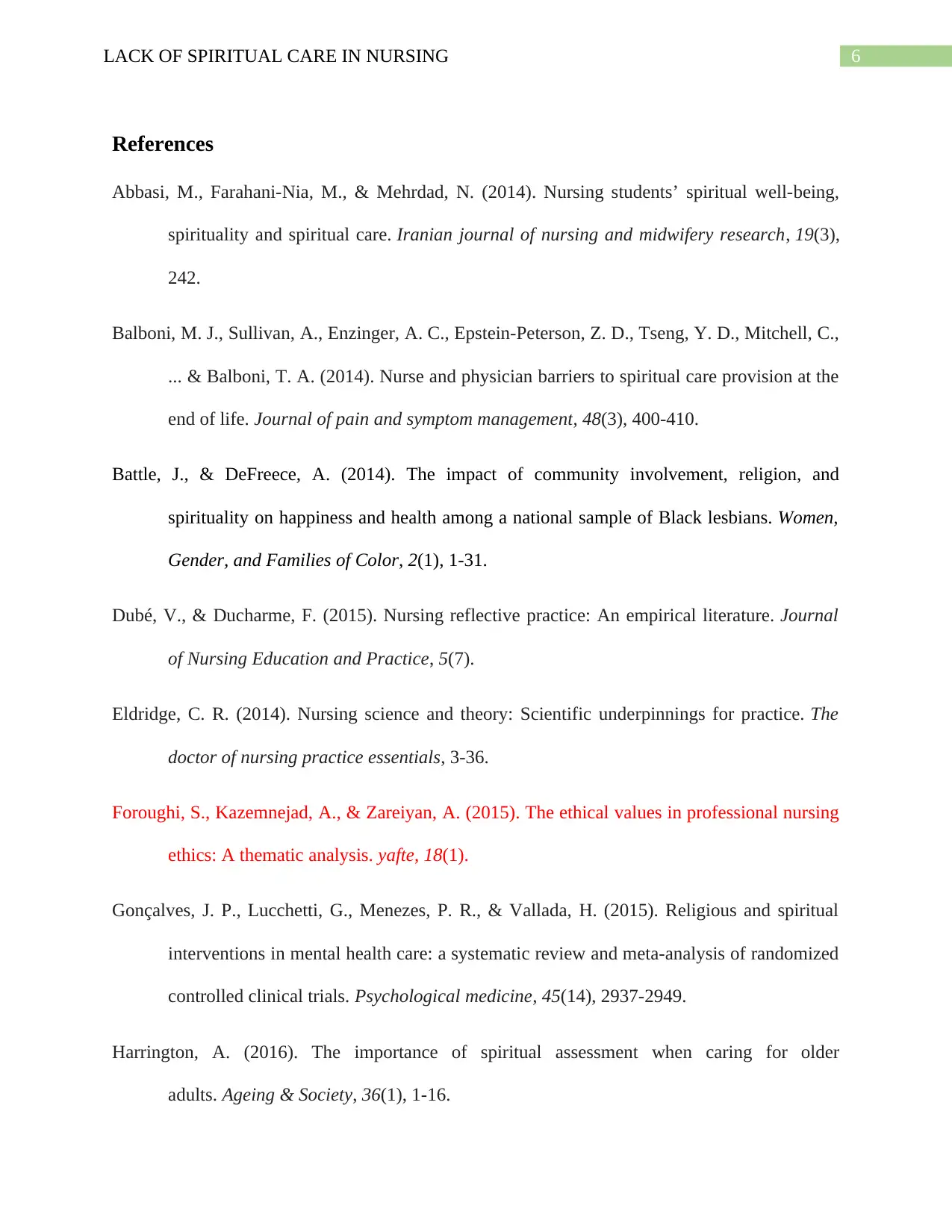
6LACK OF SPIRITUAL CARE IN NURSING
References
Abbasi, M., Farahani-Nia, M., & Mehrdad, N. (2014). Nursing students’ spiritual well-being,
spirituality and spiritual care. Iranian journal of nursing and midwifery research, 19(3),
242.
Balboni, M. J., Sullivan, A., Enzinger, A. C., Epstein-Peterson, Z. D., Tseng, Y. D., Mitchell, C.,
... & Balboni, T. A. (2014). Nurse and physician barriers to spiritual care provision at the
end of life. Journal of pain and symptom management, 48(3), 400-410.
Battle, J., & DeFreece, A. (2014). The impact of community involvement, religion, and
spirituality on happiness and health among a national sample of Black lesbians. Women,
Gender, and Families of Color, 2(1), 1-31.
Dubé, V., & Ducharme, F. (2015). Nursing reflective practice: An empirical literature. Journal
of Nursing Education and Practice, 5(7).
Eldridge, C. R. (2014). Nursing science and theory: Scientific underpinnings for practice. The
doctor of nursing practice essentials, 3-36.
Foroughi, S., Kazemnejad, A., & Zareiyan, A. (2015). The ethical values in professional nursing
ethics: A thematic analysis. yafte, 18(1).
Gonçalves, J. P., Lucchetti, G., Menezes, P. R., & Vallada, H. (2015). Religious and spiritual
interventions in mental health care: a systematic review and meta-analysis of randomized
controlled clinical trials. Psychological medicine, 45(14), 2937-2949.
Harrington, A. (2016). The importance of spiritual assessment when caring for older
adults. Ageing & Society, 36(1), 1-16.
References
Abbasi, M., Farahani-Nia, M., & Mehrdad, N. (2014). Nursing students’ spiritual well-being,
spirituality and spiritual care. Iranian journal of nursing and midwifery research, 19(3),
242.
Balboni, M. J., Sullivan, A., Enzinger, A. C., Epstein-Peterson, Z. D., Tseng, Y. D., Mitchell, C.,
... & Balboni, T. A. (2014). Nurse and physician barriers to spiritual care provision at the
end of life. Journal of pain and symptom management, 48(3), 400-410.
Battle, J., & DeFreece, A. (2014). The impact of community involvement, religion, and
spirituality on happiness and health among a national sample of Black lesbians. Women,
Gender, and Families of Color, 2(1), 1-31.
Dubé, V., & Ducharme, F. (2015). Nursing reflective practice: An empirical literature. Journal
of Nursing Education and Practice, 5(7).
Eldridge, C. R. (2014). Nursing science and theory: Scientific underpinnings for practice. The
doctor of nursing practice essentials, 3-36.
Foroughi, S., Kazemnejad, A., & Zareiyan, A. (2015). The ethical values in professional nursing
ethics: A thematic analysis. yafte, 18(1).
Gonçalves, J. P., Lucchetti, G., Menezes, P. R., & Vallada, H. (2015). Religious and spiritual
interventions in mental health care: a systematic review and meta-analysis of randomized
controlled clinical trials. Psychological medicine, 45(14), 2937-2949.
Harrington, A. (2016). The importance of spiritual assessment when caring for older
adults. Ageing & Society, 36(1), 1-16.
Paraphrase This Document
Need a fresh take? Get an instant paraphrase of this document with our AI Paraphraser
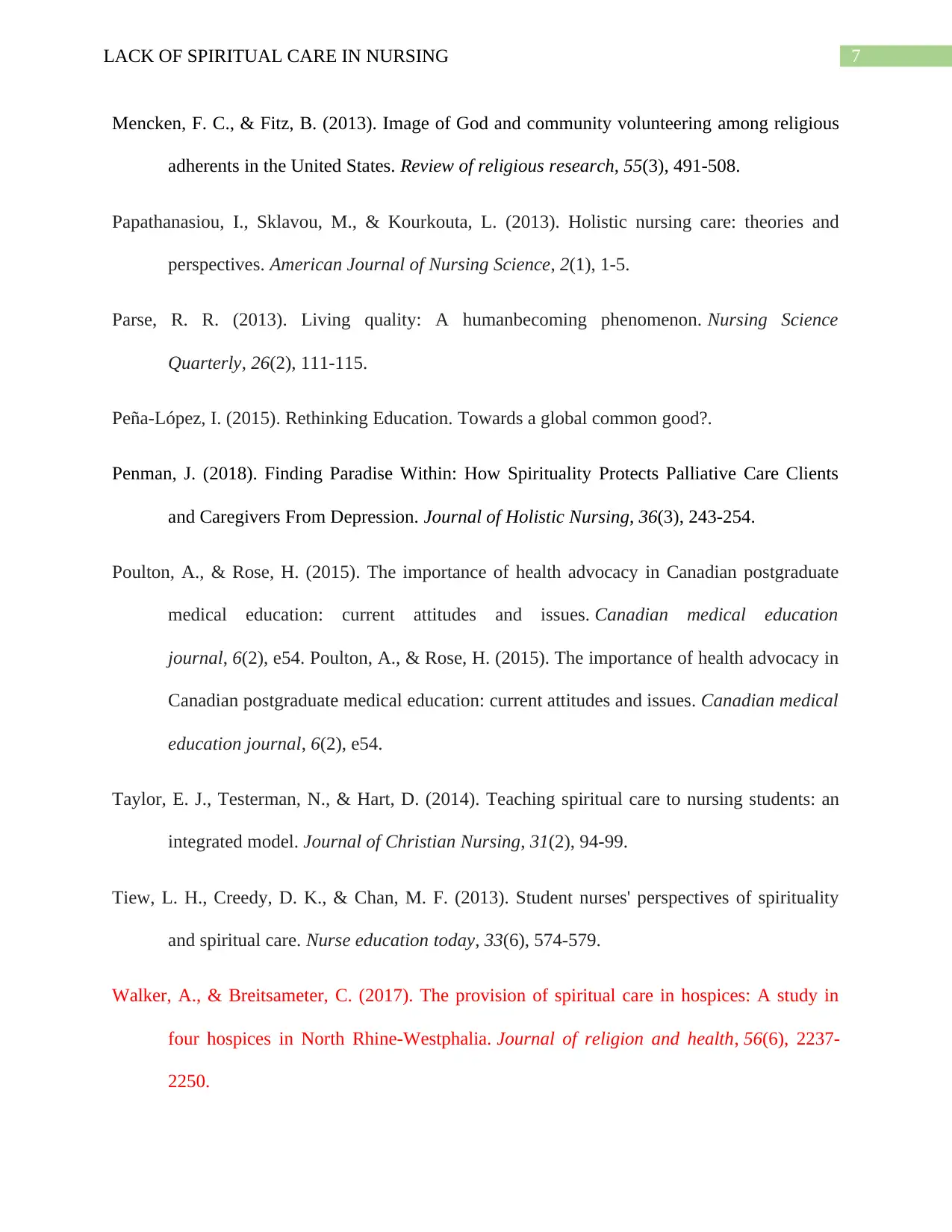
7LACK OF SPIRITUAL CARE IN NURSING
Mencken, F. C., & Fitz, B. (2013). Image of God and community volunteering among religious
adherents in the United States. Review of religious research, 55(3), 491-508.
Papathanasiou, I., Sklavou, M., & Kourkouta, L. (2013). Holistic nursing care: theories and
perspectives. American Journal of Nursing Science, 2(1), 1-5.
Parse, R. R. (2013). Living quality: A humanbecoming phenomenon. Nursing Science
Quarterly, 26(2), 111-115.
Peña-López, I. (2015). Rethinking Education. Towards a global common good?.
Penman, J. (2018). Finding Paradise Within: How Spirituality Protects Palliative Care Clients
and Caregivers From Depression. Journal of Holistic Nursing, 36(3), 243-254.
Poulton, A., & Rose, H. (2015). The importance of health advocacy in Canadian postgraduate
medical education: current attitudes and issues. Canadian medical education
journal, 6(2), e54. Poulton, A., & Rose, H. (2015). The importance of health advocacy in
Canadian postgraduate medical education: current attitudes and issues. Canadian medical
education journal, 6(2), e54.
Taylor, E. J., Testerman, N., & Hart, D. (2014). Teaching spiritual care to nursing students: an
integrated model. Journal of Christian Nursing, 31(2), 94-99.
Tiew, L. H., Creedy, D. K., & Chan, M. F. (2013). Student nurses' perspectives of spirituality
and spiritual care. Nurse education today, 33(6), 574-579.
Walker, A., & Breitsameter, C. (2017). The provision of spiritual care in hospices: A study in
four hospices in North Rhine-Westphalia. Journal of religion and health, 56(6), 2237-
2250.
Mencken, F. C., & Fitz, B. (2013). Image of God and community volunteering among religious
adherents in the United States. Review of religious research, 55(3), 491-508.
Papathanasiou, I., Sklavou, M., & Kourkouta, L. (2013). Holistic nursing care: theories and
perspectives. American Journal of Nursing Science, 2(1), 1-5.
Parse, R. R. (2013). Living quality: A humanbecoming phenomenon. Nursing Science
Quarterly, 26(2), 111-115.
Peña-López, I. (2015). Rethinking Education. Towards a global common good?.
Penman, J. (2018). Finding Paradise Within: How Spirituality Protects Palliative Care Clients
and Caregivers From Depression. Journal of Holistic Nursing, 36(3), 243-254.
Poulton, A., & Rose, H. (2015). The importance of health advocacy in Canadian postgraduate
medical education: current attitudes and issues. Canadian medical education
journal, 6(2), e54. Poulton, A., & Rose, H. (2015). The importance of health advocacy in
Canadian postgraduate medical education: current attitudes and issues. Canadian medical
education journal, 6(2), e54.
Taylor, E. J., Testerman, N., & Hart, D. (2014). Teaching spiritual care to nursing students: an
integrated model. Journal of Christian Nursing, 31(2), 94-99.
Tiew, L. H., Creedy, D. K., & Chan, M. F. (2013). Student nurses' perspectives of spirituality
and spiritual care. Nurse education today, 33(6), 574-579.
Walker, A., & Breitsameter, C. (2017). The provision of spiritual care in hospices: A study in
four hospices in North Rhine-Westphalia. Journal of religion and health, 56(6), 2237-
2250.

8LACK OF SPIRITUAL CARE IN NURSING
⊘ This is a preview!⊘
Do you want full access?
Subscribe today to unlock all pages.

Trusted by 1+ million students worldwide
1 out of 9
Related Documents
Your All-in-One AI-Powered Toolkit for Academic Success.
+13062052269
info@desklib.com
Available 24*7 on WhatsApp / Email
![[object Object]](/_next/static/media/star-bottom.7253800d.svg)
Unlock your academic potential
Copyright © 2020–2025 A2Z Services. All Rights Reserved. Developed and managed by ZUCOL.





